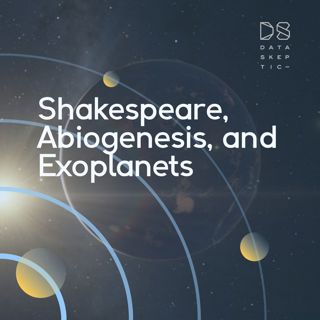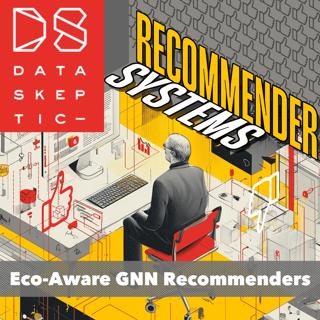![[MINI] Multi-armed Bandit Problems](https://cdn.podme.com/podcast-images/45ABF400827B5496EAF16A0F2A0E8EAD_small.jpg)
[MINI] Multi-armed Bandit Problems
The multi-armed bandit problem is named with reference to slot machines (one armed bandits). Given the chance to play from a pool of slot machines, all with unknown payout frequencies, how can you maximize your reward? If you knew in advance which machine was best, you would play exclusively that machine. Any strategy less than this will, on average, earn less payout, and the difference can be called the "regret". You can try each slot machine to learn about it, which we refer to as exploration. When you've spent enough time to be convinced you've identified the best machine, you can then double down and exploit that knowledge. But how do you best balance exploration and exploitation to minimize the regret of your play? This mini-episode explores a few examples including restaurant selection and A/B testing to discuss the nature of this problem. In the end we touch briefly on Thompson sampling as a solution.
2 Okt 201512min

Shakespeare, Abiogenesis, and Exoplanets
Our episode this week begins with a correction. Back in episode 28 (Monkeys on Typewriters), Kyle made some bold claims about the probability that monkeys banging on typewriters might produce the entire works of Shakespeare by chance. The proof shown in the show notes turned out to be a bit dubious and Dave Spiegel joins us in this episode to set the record straight. In addition to that, our discussion explores a number of interesting topics in astronomy and astrophysics. This includes a paper Dave wrote with Ed Turner titled "Bayesian analysis of the astrobiological implications of life's early emergence on Earth" as well as exoplanet discovery.
25 Sep 201558min
![[MINI] Sample Sizes](https://cdn.podme.com/podcast-images/F69CA684309CBE22658260E590923BE7_small.jpg)
[MINI] Sample Sizes
There are several factors that are important to selecting an appropriate sample size and dealing with small samples. The most important questions are around representativeness - how well does your sample represent the total population and capture all it's variance? Linhda and Kyle talk through a few examples including elections, picking an Airbnb, produce selection, and home shopping as examples of cases in which the amount of observations one has are more or less important depending on how complex the underlying system one is observing is.
18 Sep 201513min

The Model Complexity Myth
There's an old adage which says you cannot fit a model which has more parameters than you have data. While this is often the case, it's not a universal truth. Today's guest Jake VanderPlas explains this topic in detail and provides some excellent examples of when it holds and doesn't. Some excellent visuals articulating the points can be found on Jake's blog Pythonic Perambulations, specifically on his post The Model Complexity Myth. We also touch on Jake's work as an astronomer, his noteworthy open source contributions, and forthcoming book (currently available in an Early Edition) Python Data Science Handbook.
11 Sep 201530min
![[MINI] Distance Measures](https://cdn.podme.com/podcast-images/0DBA47315101CED56089DA66F715B12B_small.jpg)
[MINI] Distance Measures
There are many occasions in which one might want to know the distance or similarity between two things, for which the means of calculating that distance is not necessarily clear. The distance between two points in Euclidean space is generally straightforward, but what about the distance between the top of Mount Everest to the bottom of the ocean? What about the distance between two sentences? This mini-episode summarizes some of the considerations and a few of the means of calculating distance. We touch on Jaccard Similarity, Manhattan Distance, and a few others.
4 Sep 201512min

ContentMine
ContentMine is a project which provides the tools and workflow to convert scientific literature into machine readable and machine interpretable data in order to facilitate better and more effective access to the accumulated knowledge of human kind. The program's founder Peter Murray-Rust joins us this week to discuss ContentMine. Our discussion covers the project, the scientific publication process, copywrite, and several other interesting topics.
28 Aug 201553min
![[MINI] Structured and Unstructured Data](https://cdn.podme.com/podcast-images/9D1D3140321C522F3AACFE7871FE0308_small.jpg)
[MINI] Structured and Unstructured Data
Today's mini-episode explains the distinction between structured and unstructured data, and debates which of these categories best describe recipes.
21 Aug 201513min

Measuring the Influence of Fashion Designers
Yusan Lin shares her research on using data science to explore the fashion industry in this episode. She has applied techniques from data mining, natural language processing, and social network analysis to explore who are the innovators in the fashion world and how their influence effects other designers. If you found this episode interesting and would like to read more, Yusan's papers Text-Generated Fashion Influence Model: An Empirical Study on Style.com and The Hidden Influence Network in the Fashion Industry are worth reading.
14 Aug 201524min






















